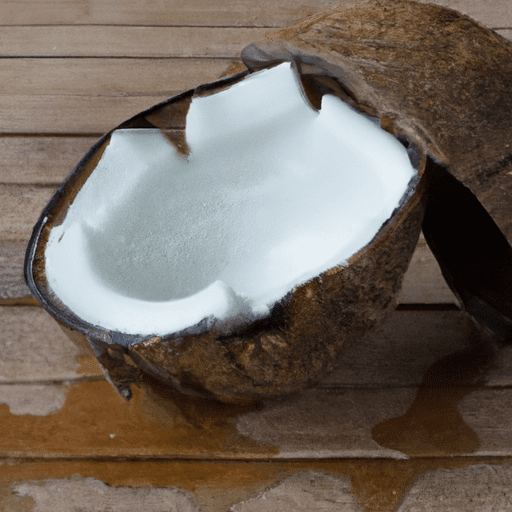The Versatile Coconut: A Tropical Treasure in the Kitchen
The coconut, a true gift from nature, is not only a tropical delight but also a versatile ingredient that adds a unique flavor and texture to a variety of dishes. Whether you’re using the meat, milk, or oil extracted from this versatile fruit, the possibilities in the kitchen are endless. In this blog post, we’ll explore the taste, common uses, nutritional value, and fascinating history of the coconut.
Taste and Texture
When it comes to taste, coconuts offer a deliciously sweet and nutty flavor that can transport your tastebuds to a tropical paradise. The white flesh, known as coconut meat, is incredibly versatile. It can be consumed fresh, shredded, or dried. The texture can range from tender and jelly-like to crunchy, depending on the stage of maturity.
Common Uses in Cooking
Coconuts are a staple ingredient in many cuisines around the world. From savory to sweet, there’s a wide range of dishes where coconuts take the center stage.
Curries and Soups: The creamy texture and subtle sweetness of coconut milk make it a popular ingredient in curries and soups. It adds depth and richness to dishes like Thai green curry or Indian coconut chicken curry.
Baking: Shredded coconut and coconut flour offer a delightful twist to baked goods. They can be incorporated into cakes, cookies, muffins, and even granola bars, bringing tropical flair to your dessert table.
Smoothies and Drinks: Coconut water, the clear liquid inside young coconuts, is not only hydrating but also incredibly refreshing. Its slightly sweet and nutty taste makes it a great base for smoothies, cocktails, and tropical beverages.
Desserts: Whether it’s coconut custard pie, macaroons, or creamy coconut ice cream, desserts featuring coconut are sure to satisfy any sweet tooth.
Oil for Cooking: Coconut oil, with its high smoke point and distinct flavor, is a popular choice for cooking and baking. It can be used for sautéing, frying, or as a substitute for butter or other oils in recipes.
Nutritional Value
Apart from being delicious, coconuts offer several health benefits. They are a good source of fiber, vitamins C, E, B1, B3, B5, and B6, and minerals such as iron, selenium, sodium, calcium, and magnesium. In moderation, coconuts can be a part of a healthy and balanced diet.
Interesting History and Facts
Coconuts have been an essential part of tropical regions for centuries, and their history is as rich as their flavor. Here are a few fascinating facts:
Traveling Coconuts: Coconuts are known to have a natural ability to float in seawater, allowing them to travel long distances before washing up on distant shores. This unique feature has contributed to their global distribution.
Tree of Life: In some cultures, the coconut tree is considered the “tree of life” due to its versatility and the numerous uses of its various parts. From food and drink to shelter, clothing, and even medicine, every part of the tree can be put to use.
Coconuts and World War II: During World War II, coconut water was used as an intravenous fluid replacement due to its sterile properties, similar to human plasma. It was used when saline solutions were scarce.
Coconut Water as a Natural Electrolyte: Coconut water is naturally rich in electrolytes and has been used as a natural rehydration drink, especially in tropical regions. It contains essential minerals like potassium, sodium, and magnesium.
In conclusion, the coconut truly deserves its reputation as a versatile and delicious ingredient. From its unique taste and texture to its wide range of culinary uses, this tropical treasure brings a touch of the exotic to dishes from around the world. So why not grab a fresh coconut, put on your chef’s hat, and start exploring the endless possibilities that this magnificent fruit has to offer? Happy cooking and enjoy the journey to tropical flavors!
Coconut
Origin: The coconut (Cocos nucifera) is a tropical fruit that is believed to have originated in the Southeast Asian region, particularly in the Philippines and Malaysia. It is widely cultivated in many tropical regions around the world.
Common Uses: Coconut is an incredibly versatile ingredient that finds its way into a wide range of culinary applications. The flesh of the coconut is commonly used in both sweet and savory dishes, as well as in desserts, curries, soups, and stews. Coconut milk, derived from the grated flesh, is a popular ingredient in Asian, Indian, and Caribbean cuisines, while coconut oil is widely used for cooking, baking, and frying.
Nutritional Benefits: Coconut is rich in nutrients, offering a variety of health benefits. It is an excellent source of manganese, copper, and iron, which are important for energy production and antioxidant defense. Coconuts also contain significant amounts of fiber, providing digestive benefits. Additionally, they are a good source of medium-chain triglycerides (MCTs), which are easily metabolized and used by the body for energy.
Unique Properties: One interesting characteristic of the coconut is its high fat content. While it was previously viewed as an unhealthy saturated fat source, recent research suggests that the unique composition of fats in coconuts, including MCTs, may actually have various health benefits. Moreover, coconut water, found inside young coconuts, is a popular hydrating beverage due to its isotonic nature and natural electrolytes.
Historical Significance: Coconuts have been an important part of the diet and culture in many tropical regions for centuries. They have played a significant role in the livelihoods of people living in coastal areas and islands, providing food, water, oil, fibers, and building materials. The historical significance of coconuts can be found in folklore, literature, and traditional practices of various cultures.
Note: As always, moderation is key when incorporating any ingredient into your diet. While coconuts offer nutritional benefits, it’s important to consider overall dietary balance and individual needs.




Use the share button below if you liked it.
It makes me smile, when I see it.